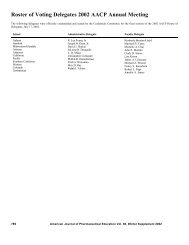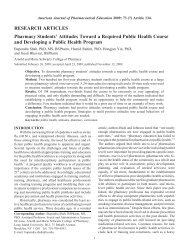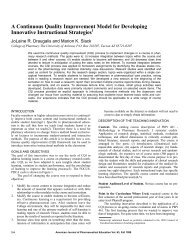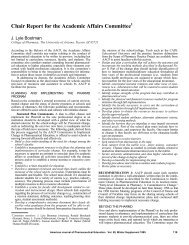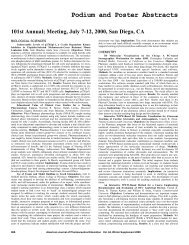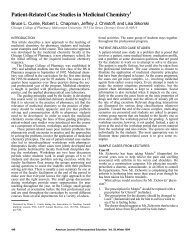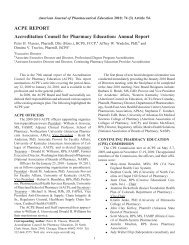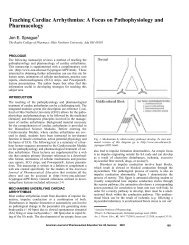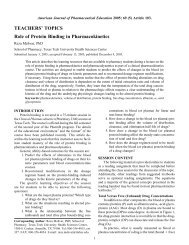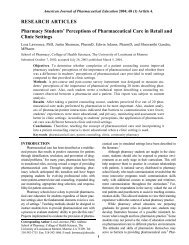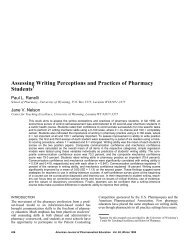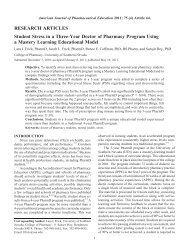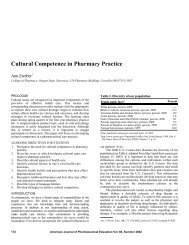INSTRUCTIONAL DESIGN AND ASSESSMENT Guest Speakers in ...
INSTRUCTIONAL DESIGN AND ASSESSMENT Guest Speakers in ...
INSTRUCTIONAL DESIGN AND ASSESSMENT Guest Speakers in ...
Create successful ePaper yourself
Turn your PDF publications into a flip-book with our unique Google optimized e-Paper software.
American Journal of Pharmaceutical Education 2011; 75 (2) Article 28.<br />
<strong>INSTRUCTIONAL</strong> <strong>DESIGN</strong> <strong>AND</strong> <strong>ASSESSMENT</strong><br />
<strong>Guest</strong> <strong>Speakers</strong> <strong>in</strong> a Professional Development Sem<strong>in</strong>ar Series<br />
Joseph A. Zorek, BA, Norman L. Katz, PhD, and Nicholas G. Popovich, PhD<br />
College of Pharmacy, University of Ill<strong>in</strong>ois at Chicago<br />
Submitted September 22, 2010; accepted November 17, 2010; published March 10, 2011.<br />
Objective. To evaluate the impact guest speakers have on student development <strong>in</strong> a professional<br />
development sem<strong>in</strong>ar series.<br />
Design. Over a 5-semester period, presentations were given by 18 guest speakers as part of a professional<br />
development sem<strong>in</strong>ar series.<br />
Assessment. A 28-item survey <strong>in</strong>strument was constructed and adm<strong>in</strong>istered to 68 students to assess the<br />
impact of the guest speakers on the students’ professional development. Forty-six (68%) students completed<br />
the survey <strong>in</strong>strument, and the results demonstrated the value of the guest speakers, most notably <strong>in</strong><br />
the areas of career development and professional responsibility.<br />
Conclusion. Expos<strong>in</strong>g pharmacy students to guest speakers from varied pharmacy career paths positively<br />
impacted students’ knowledge of career options and professional development.<br />
Keywords: guest speakers, professional development, career counsel<strong>in</strong>g, advis<strong>in</strong>g, mentor<strong>in</strong>g<br />
INTRODUCTION<br />
Guidel<strong>in</strong>e 16.1 from the Accreditation Council for<br />
Pharmacy Education’s (ACPE’s) Accreditation Standards<br />
and Guidel<strong>in</strong>es for the Professional Program <strong>in</strong> Pharmacy<br />
Lead<strong>in</strong>g to the Doctor of Pharmacy Degree (Standards<br />
2007) directs colleges and schools of pharmacy to ‘‘provide<br />
academic advis<strong>in</strong>g and career-pathway counsel<strong>in</strong>g,’’ ‘‘coord<strong>in</strong>ate<br />
the availability of personal counsel<strong>in</strong>g,’’ and ‘‘plan<br />
and participate <strong>in</strong> activities that support the development<br />
of students as professionals.’’ 1 Re<strong>in</strong>forc<strong>in</strong>g the importance<br />
of these requirements, ACPE also suggests <strong>in</strong> Guidel<strong>in</strong>e<br />
26.6 that the faculty evaluation process should recognize<br />
and value the important roles faculty members play as academic<br />
advisors and career pathway counselors. Unfortunately,<br />
pressures and time constra<strong>in</strong>ts related to teach<strong>in</strong>g,<br />
research, and scholarship obligations often become barriers<br />
for faculty members to provide requisite student services.<br />
This identified curricular deficit prompted 2 faculty advisors<br />
at the University of Ill<strong>in</strong>ois at Chicago College of Pharmacy<br />
(UIC COP) to develop and implement a professional<br />
development sem<strong>in</strong>ar series for student advisees. Additional<br />
<strong>in</strong>spiration for the series was drawn from (1) the observed<br />
discrepancy between the plethora of opportunities that exist<br />
for doctor of pharmacy (PharmD) graduates and the advisees’<br />
limited knowledge of these opportunities, and (2)<br />
Correspond<strong>in</strong>g Author: Joseph A. Zorek, 833 S. Wood<br />
Street, Chicago, IL 60612, University of Ill<strong>in</strong>ois at Chicago<br />
College of Pharmacy. Tel: 773-263-6446. E-mail: jzorek2@<br />
uic.edu<br />
1<br />
the observed failure of many pharmacy graduates to meet<br />
expectations related to professional development.<br />
The educational environment and rationale for the<br />
development of the professional development sem<strong>in</strong>ar<br />
series has been described previously, as have several <strong>in</strong>vestigations<br />
<strong>in</strong>to its impact on various aspects of professional<br />
education. 2-4 Start<strong>in</strong>g with the second semester of<br />
the first year (P1) and cont<strong>in</strong>u<strong>in</strong>g throughout the on-campus<br />
portion of the curriculum, the sem<strong>in</strong>ar is offered each<br />
semester as a 1 credit-hour elective for the advisees of the<br />
2 faculty members at the UIC COP. The <strong>in</strong>itial evaluation<br />
of the sem<strong>in</strong>ar series successfully demonstrated student<br />
development of various performance-based skills. 2 Subsequent<br />
research demonstrated significant improvement<br />
<strong>in</strong> the development of self-efficacy among sem<strong>in</strong>ar participants,<br />
as well as the value of a microteach<strong>in</strong>g exercise<br />
to help students develop their communication, criticalth<strong>in</strong>k<strong>in</strong>g,<br />
and problem-solv<strong>in</strong>g skills. 3,4 This study was<br />
<strong>in</strong>tended to explore the use and effectiveness of add<strong>in</strong>g<br />
guest speakers with<strong>in</strong> the sem<strong>in</strong>ar series, the <strong>in</strong>clusion<br />
of which was backed by ACPE Guidel<strong>in</strong>e 23.4, direct<strong>in</strong>g<br />
colleges and schools of pharmacy to ‘‘implement strategies<br />
and programs to broaden the professional horizons<br />
of students,’’ suggest<strong>in</strong>g, as one example, the use of guest<br />
lecturers.<br />
The term professionalism appears extensively<br />
throughout ACPE’s Standards 2007 and was identified as<br />
1 of the 12 areas emphasized dur<strong>in</strong>g the most recent<br />
standards revision process. Standards 2007 also emphasized<br />
various components of professionalism, <strong>in</strong>clud<strong>in</strong>g
American Journal of Pharmaceutical Education 2011; 75 (2) Article 28.<br />
communication, critical th<strong>in</strong>k<strong>in</strong>g, and <strong>in</strong>terpersonal skills, as<br />
well as professional responsibility. Over the course of this<br />
decade, the academy, <strong>in</strong> conjunction with professional<br />
organizations, has cont<strong>in</strong>ued to <strong>in</strong>novate, evaluate, and<br />
promote these important aspects of pharmaceutical education.<br />
5-12 In recent years, researchers have begun to lay<br />
the foundation for the systematic evaluation of professionalism<br />
as an <strong>in</strong>tegral part of the curriculum. 13,14 Build<strong>in</strong>g on<br />
this foundation, the objective of this study was to evaluate<br />
the impact that systematically expos<strong>in</strong>g PharmD students<br />
to guest speakers had on various aspects of student development,<br />
with an emphasis on career plann<strong>in</strong>g and student<br />
professionalism.<br />
<strong>DESIGN</strong><br />
Created as a forum to provide academic advis<strong>in</strong>g and<br />
career pathway counsel<strong>in</strong>g <strong>in</strong> an efficient manner to many<br />
advisees simultaneously, the <strong>in</strong>troduction of guest speakers,<br />
primarily from varied pharmacy career paths, was orig<strong>in</strong>ally<br />
envisioned as a means to achieve the follow<strong>in</strong>g 3 educational<br />
outcomes for enrolled advisees:<br />
d Compare and contrast the objectives of a pharmacy<br />
residency versus a pharmacy fellowship<br />
d<br />
d<br />
List career paths open to the pharmacy graduate<br />
Create a plan for the selection of advanced pharmacy<br />
practice experiences (APPEs)<br />
<strong>Guest</strong> speakers were selected based on a comb<strong>in</strong>ation<br />
of students’ requests and a desire of the faculty directors to<br />
ensure representation from a broad range of career options.<br />
Individuals work<strong>in</strong>g <strong>in</strong> the pharmaceutical <strong>in</strong>dustry, <strong>in</strong>dependent<br />
pharmacy practice, professional associations, longterm<br />
and managed care, and state board of pharmacy, among<br />
others, were <strong>in</strong>vited to address the students. The majority of<br />
guest speakers were pharmacists. The speakers chosen/<strong>in</strong>vited<br />
differed from class to class, depend<strong>in</strong>g on the students’<br />
suggestions/requests.<br />
To m<strong>in</strong>imize the speakers’ preparation time, reflective<br />
questions were created based on the specific career<br />
path of the <strong>in</strong>vited speaker and provided beforehand (Appendix<br />
1). The <strong>in</strong>tent was to provide a framework for the<br />
presenter and allow the presentation to be more <strong>in</strong>teractive,<br />
which is important for the millennial generation. 15<br />
<strong>Speakers</strong> were <strong>in</strong>formed about their allotted time and<br />
requested to reserve the last 10 m<strong>in</strong>utes of the session<br />
for questions and answers. They also were provided with<br />
<strong>in</strong>formation about the class itself, eg, number of students<br />
and their year of professional study. <strong>Speakers</strong> were advised<br />
not to deliver PowerPo<strong>in</strong>t presentations but to<br />
create an <strong>in</strong>formal ‘‘give and take’’ environment.<br />
<strong>Guest</strong> speakers were asked to provide a curriculum<br />
vita or resume, which was used to <strong>in</strong>troduce the speaker at<br />
the beg<strong>in</strong>n<strong>in</strong>g of the session. After each presentation,<br />
2<br />
students had 1 week to submit a reflection of unspecified<br />
length, demonstrat<strong>in</strong>g what they learned from and/or<br />
how they were <strong>in</strong>fluenced by the speaker. Subsequently,<br />
the faculty members collated the students’ reflections,<br />
deleted their names, and forwarded their comments<br />
electronically to <strong>in</strong>dividual guest speakers as a means<br />
of provid<strong>in</strong>g feedback and illustrat<strong>in</strong>g how the speakers<br />
<strong>in</strong>fluenced the students.<br />
EVALUATION <strong>AND</strong> <strong>ASSESSMENT</strong><br />
A survey <strong>in</strong>strument consist<strong>in</strong>g of 24 Likert-type<br />
scale items with 4 open-ended questions was created<br />
to assess student development when exposed to guest<br />
speakers. The 24 Likert-type scale items were divided<br />
<strong>in</strong>to 3 categories: <strong>in</strong>structional method, written reflection<br />
assignment, and broaden<strong>in</strong>g student outlook/personal and<br />
social growth. While the survey <strong>in</strong>strument was <strong>in</strong>tended<br />
to assess student development globally, a key aim was to<br />
evaluate the impact of guest speakers on student professionalism.<br />
As a result, over one-third of survey items were<br />
devoted to student professionalism (Table 1: Items 6-12,<br />
15-17). The 4 open-ended questions asked respondents<br />
to comment on the number of speakers used throughout<br />
the series, list key ‘‘take away’’ messages, suggest additional<br />
areas of pharmacy practice from which to recruit<br />
future guest speakers, and provide additional thoughts<br />
and/or reflections not captured by the other survey items.<br />
A short demographic form at the end of the survey <strong>in</strong>strument<br />
asked the respondent’s gender, class year, age<br />
range, and whether a previous college degree(s) had been<br />
earned.<br />
A review of the survey items and open-ended questions<br />
was conducted by 7 external pharmacy academicians<br />
with <strong>in</strong>structional design experience <strong>in</strong> the PharmD curriculum.<br />
The content validity panel was asked to evaluate<br />
each item on a 5-po<strong>in</strong>t scale rang<strong>in</strong>g from a highly pert<strong>in</strong>ent/valid<br />
item to a highly <strong>in</strong>valid item. For item acceptance,<br />
a 70% decision rule was <strong>in</strong>stituted, eg, 5 experts had<br />
to <strong>in</strong>dicate the item was either highly pert<strong>in</strong>ent/valid or<br />
valid. In addition, a request for exemption was approved<br />
by the UIC Institutional Review Board of the Office for<br />
the Protection of Research Subjects.<br />
Every advisee from the graduat<strong>in</strong>g classes of 2008,<br />
2009, and 2010 who participated <strong>in</strong> the professional development<br />
sem<strong>in</strong>ar series was contacted via e-mail and<br />
asked to complete the survey <strong>in</strong>strument (N 5 68): 23<br />
from the class of 2008, 24 from the class of 2009, and<br />
21 from the class of 2010. One follow-up e-mail was<br />
forwarded to all advisees 1 month after the orig<strong>in</strong>al e-<br />
mail as a rem<strong>in</strong>der. As students from the graduat<strong>in</strong>g class<br />
of 2010 were currently enrolled <strong>in</strong> the PharmD program,<br />
they were <strong>in</strong>formed their participation <strong>in</strong> the survey was
American Journal of Pharmaceutical Education 2011; 75 (2) Article 28.<br />
Table 1. Survey to Determ<strong>in</strong>e the Impact of <strong>Guest</strong> <strong>Speakers</strong> on Pharmacy Students Enrolled <strong>in</strong> a Professional Development<br />
Sem<strong>in</strong>ar Series (%)<br />
SA a A a N a D a SD a<br />
Instructional Methods: In the professional development sem<strong>in</strong>ar series:<br />
1. <strong>Guest</strong> speakers enhanced my learn<strong>in</strong>g 54.4 43.5 2.2 0 0<br />
2. An appropriate number of guest speakers was used 60.9 39.1 0 0 0<br />
3. In general, the guest speakers communicated effectively 54.4 41.3 4.4 0 0<br />
4. The guest speakers exposed me to a variety of careers <strong>in</strong> the pharmacy profession 87.0 10.9 2.2 0 0<br />
5. Sufficient time was allowed for students to ask questions of the guest speakers 52.2 41.3 4.4 2.2 0<br />
6. Ask<strong>in</strong>g questions helped me improve my oral communication skills 28.3 34.8 32.6 4.4 0<br />
7. Hav<strong>in</strong>g guest speakers helped improve my self-confidence to ask questions 17.4 37.0 41.3 4.4 0<br />
The Written Reflection Assignments: Writ<strong>in</strong>g about guest speakers’ presentations:<br />
8. Broadened my th<strong>in</strong>k<strong>in</strong>g about my societal role as a pharmacist 54.4 39.1 6.5 0 0<br />
9. Broadened my def<strong>in</strong>ition of what it means to be a pharmacist 54.4 39.1 4.4 2.2 0<br />
10. Improved my written communication skills 23.9 52.2 21.8 2.2 0<br />
11. Improved my writ<strong>in</strong>g skills <strong>in</strong> other courses 8.7 39.1 45.7 6.5 0<br />
12. Helped me to th<strong>in</strong>k critically 28.3 47.8 23.9 0 0<br />
13. Fostered a trust<strong>in</strong>g relationship with my advisor 65.2 34.8 0 0 0<br />
14. Receiv<strong>in</strong>g feedback from my advisor was valuable to me 80.4 17.4 2.2 0 0<br />
Broaden<strong>in</strong>g Student Outlook/Personal and Social Growth: The guest speakers:<br />
15. Made me become more empathetic toward patients who live with chronic or 47.8 34.8 15.2 2.2 0<br />
life-threaten<strong>in</strong>g illnesses<br />
16. Increased my awareness that, as a future pharmacist, it is my professional 60.9 30.4 6.5 2.2 0<br />
responsibility to use my knowledge for the benefit of others<br />
17. Increased my awareness that, as a future pharmacist, I must work now to<br />
63.1 23.9 10.9 2.2 0<br />
improve my communication and <strong>in</strong>terpersonal skills so that others may benefit<br />
from those improvements <strong>in</strong> the future<br />
18. Exposed me to pharmacy career opportunities I did not know about beforehand 76.1 23.9 0 0 0<br />
19. Helped me focus on my career goals 43.5 41.3 15.2 0 0<br />
20. Helped me beg<strong>in</strong> to formulate my career goals 43.5 47.8 8.7 0 0<br />
21. Contributed to my reth<strong>in</strong>k<strong>in</strong>g and possibly chang<strong>in</strong>g my pharmacy career goals 41.3 39.1 15.2 4.4 0<br />
22. Helped me decide, <strong>in</strong> part, which advanced pharmacy practice experiences to 41.3 43.5 8.7 6.5 0<br />
select for my fourth professional year<br />
23. Made me more aware of my career <strong>in</strong>terests 43.5 41.3 15.2 0 0<br />
24. Increased my awareness of personal talents I could use <strong>in</strong> my pharmacy career 23.9 47.8 26.1 2.2 0<br />
a SA 5 strongly agree, A 5 agree, N 5 neutral, D 5 disagree, SD 5 strongly disagree<br />
voluntary and that decl<strong>in</strong><strong>in</strong>g to participate would not affect<br />
their grades or class stand<strong>in</strong>g. Student responses were considered<br />
confidential, and students were <strong>in</strong>formed that data<br />
would be reported only <strong>in</strong> aggregate for purposes of statistical<br />
analysis and research publication.<br />
Sixty-eight percent (46) of advisees responded to the<br />
survey <strong>in</strong>strument: 10 from the class of 2008, 16 from the<br />
class of 2009, and 20 from the class of 2010. Twenty-four<br />
percent of survey respondents were male, which was a deviation<br />
from the 34% male population of the general student<br />
body. Seventy-three percent of survey respondents<br />
were between the ages of 23 and 26 years, while only 59%<br />
of students <strong>in</strong> the general student body fell <strong>in</strong> this age<br />
range. Additionally, 36% of survey respondents reported<br />
hav<strong>in</strong>g earned a baccalaureate degree or higher, compared<br />
to 67% from the general student body.<br />
3<br />
The majority of respondents from the surveyed classes<br />
perceived the benefits of guest speakers (Table 1),<br />
provid<strong>in</strong>g evidence to support the objective that this educational<br />
activity positively impacted students <strong>in</strong> terms<br />
of professional development and career-pathway counsel<strong>in</strong>g.<br />
Related to career-pathway counsel<strong>in</strong>g, over 80%<br />
of students strongly agreed or agreed the guest speaker’s<br />
exercise:<br />
d exposed them to pharmacy career opportunities<br />
they did not know about beforehand (100%)<br />
d exposed them to a variety of careers <strong>in</strong> the pharmacy<br />
profession (97%)<br />
d helped them beg<strong>in</strong> to formulate their career goals<br />
(91%)<br />
d helped them decide, <strong>in</strong> part, which APPEs to<br />
select for their fourth year (P4) (84%)
American Journal of Pharmaceutical Education 2011; 75 (2) Article 28.<br />
d made them more aware of their career <strong>in</strong>terests<br />
(84%)<br />
d contributed to their reth<strong>in</strong>k<strong>in</strong>g and possibly<br />
chang<strong>in</strong>g their pharmacy career goals (80%)<br />
Regard<strong>in</strong>g professional development, over 80% of students<br />
strongly agreed or agreed that the guest speakers:<br />
d broadened their th<strong>in</strong>k<strong>in</strong>g about their societal role<br />
as a pharmacist (93%)<br />
d broadened their def<strong>in</strong>ition of what it means to be<br />
a pharmacist (93%)<br />
d <strong>in</strong>creased awareness that, as future pharmacists,<br />
it is their professional responsibility to use their<br />
knowledge for the benefit of others (91%)<br />
d <strong>in</strong>creased awareness that, as future pharmacists,<br />
they must work now to improve their communication<br />
and <strong>in</strong>terpersonal skills so that others may benefit<br />
from those improvements <strong>in</strong> the future (86%)<br />
d made them more empathetic toward patients who<br />
live with chronic or life-threaten<strong>in</strong>g illnesses<br />
(82%)<br />
N<strong>in</strong>ety-seven percent of respondents reported that<br />
guest speakers enhanced their learn<strong>in</strong>g. The students felt<br />
they were exposed to an appropriate number of guest<br />
speakers (100%), and were provided sufficient time to<br />
ask questions follow<strong>in</strong>g the presentations (95%). Respondents<br />
also found the guest speakers to be effective communicators<br />
(95%).<br />
Sixty-three percent of advisees found that ask<strong>in</strong>g<br />
questions follow<strong>in</strong>g the presentations improved their oral<br />
communication skills. Seventy-six percent of advisees<br />
reported improvement <strong>in</strong> their written communication<br />
skills attributable to the written reflection assignment,<br />
and 47% determ<strong>in</strong>ed this improvement <strong>in</strong> writ<strong>in</strong>g skills<br />
transferred to other courses. Data also demonstrated that<br />
the exercise helped students th<strong>in</strong>k critically (76%), while<br />
reported improvement <strong>in</strong> self-confidence to ask questions<br />
of presenters was more modest (54%). Differences were<br />
reported among graduat<strong>in</strong>g classes regard<strong>in</strong>g the need to<br />
improve communication and <strong>in</strong>terpersonal skills to benefit<br />
society <strong>in</strong> the future (2008, 100%; 2009, 81%; 2010,<br />
85%). There were notable differences <strong>in</strong> the development<br />
of empathy among graduat<strong>in</strong>g classes: 70% of advisees<br />
from the class of 2008, 93% from the class of 2009, and<br />
80% from the class of 2010 reported that exposure to<br />
guest speakers made them more empathetic toward patients.<br />
These differences may be due to guest speakers’<br />
encouragement that students make the patient their first<br />
priority. In addition, the class of 2010 advisees had the<br />
benefit of 1 guest pharmacist who shared his personal<br />
experience as a cancer patient undergo<strong>in</strong>g chemotherapy<br />
and the need for pharmacists to be empathetic toward<br />
their patients.<br />
4<br />
Several themes emerged from the open-ended section<br />
of the survey <strong>in</strong>strument. Most notably, when asked to<br />
list what they would take away from the exercise, the<br />
value of network<strong>in</strong>g and ma<strong>in</strong>ta<strong>in</strong><strong>in</strong>g an open m<strong>in</strong>d, as<br />
well as the knowledge that pharmacy is a ‘‘small world’’<br />
emerged as themes. Specifically, 9 respondents stated<br />
that the series taught them the value of network<strong>in</strong>g,<br />
6 cited they learned not to ‘‘burn bridges,’’ and 6 cited<br />
the value of ma<strong>in</strong>ta<strong>in</strong><strong>in</strong>g an open m<strong>in</strong>d to new ideas and<br />
opportunities. Three students also commented the series<br />
taught them the importance of participat<strong>in</strong>g <strong>in</strong> professional<br />
organizations.<br />
DISCUSSION<br />
The professional development sem<strong>in</strong>ar series exceeded<br />
the curricular requirements outl<strong>in</strong>ed <strong>in</strong> ACPE Guidel<strong>in</strong>es<br />
13.3, 16.1, 23.4 and 26.6. The notion of systematically l<strong>in</strong>k<strong>in</strong>g<br />
students with pharmacy professionals from a variety<br />
of career paths dur<strong>in</strong>g the classroom-based portion of the<br />
PharmD curriculum as a mechanism to address various<br />
ACPE guidel<strong>in</strong>es is progressive. It also taps <strong>in</strong>to the tremendous<br />
potential of the ‘‘hidden curriculum,’’ while offer<strong>in</strong>g<br />
a mechanism to control and avoid pitfalls associated<br />
with negative role model<strong>in</strong>g. 10,16 Specifically, by <strong>in</strong>vit<strong>in</strong>g<br />
speakers who the faculty members knew would demonstrate<br />
professionalism, they could ensure positive role<br />
model<strong>in</strong>g would take place.<br />
The series was a unique educational environment that<br />
allowed time-constra<strong>in</strong>ed faculty members to provide academic<br />
advis<strong>in</strong>g and career-pathway counsel<strong>in</strong>g efficiently<br />
and effectively to many advisees simultaneously. An additional<br />
noteworthy educational outcome was the consistent<br />
improvement <strong>in</strong> student professionalism reported by sem<strong>in</strong>ar<br />
participants, <strong>in</strong>dicated by their responses to the survey<br />
items devoted to this area of development.<br />
Brown and Ferrill stressed the need to redef<strong>in</strong>e professionalism<br />
as a critical step <strong>in</strong> improv<strong>in</strong>g student professionalism,<br />
build<strong>in</strong>g on the Hammer and colleagues<br />
suggestion that pharmacy educators stress, among other<br />
attributes, empathy, communication, and personal values<br />
over the more traditional behaviors focus<strong>in</strong>g on dress<strong>in</strong>g<br />
professionally, ma<strong>in</strong>ta<strong>in</strong><strong>in</strong>g good groom<strong>in</strong>g habits, and be<strong>in</strong>g<br />
punctual. 9,11 The authors <strong>in</strong>corporated this suggestion<br />
<strong>in</strong>to this study, def<strong>in</strong><strong>in</strong>g student professionalism relat<strong>in</strong>g<br />
to communication, critical-th<strong>in</strong>k<strong>in</strong>g and <strong>in</strong>terpersonal<br />
skills, as well as the development of empathy and professional<br />
responsibility. In terms of this def<strong>in</strong>ition, systematically<br />
expos<strong>in</strong>g pharmacy students to guest speakers from<br />
varied pharmacy career paths successfully improved student<br />
professionalism.<br />
A concerted effort to improve student professional<br />
development is required to ensure PharmD graduates
American Journal of Pharmaceutical Education 2011; 75 (2) Article 28.<br />
are prepared to provide medication therapy management<br />
and pharmaceutical care services, which CAPE and<br />
ACPE have identified as the future of the profession. 1,17<br />
This is crucial because of the grow<strong>in</strong>g recognition of the<br />
value of pharmacists as members of the health care<br />
team. 18 PharmD graduates must demonstrate professionalism<br />
and add value to patient care <strong>in</strong>itiatives while overcom<strong>in</strong>g<br />
mischaracterizations and stereotypes of pharmacy<br />
and pharmacy education. 19,20<br />
With an evolv<strong>in</strong>g shift away from a product orientation<br />
to one of a service-directed patient-care orientation,<br />
implementation of similar sem<strong>in</strong>ar series across the country<br />
could, as demonstrated by this study, help develop <strong>in</strong><br />
PharmD students the professionalism required to create<br />
and uphold the covenantal relationship between patients<br />
and pharmacists described by Roth and Zlatic as key to<br />
the profession’s evolution. 11 Improv<strong>in</strong>g student professionalism<br />
is critical to putt<strong>in</strong>g to rest l<strong>in</strong>ger<strong>in</strong>g questions<br />
raised about our profession by Abraham Flexner’s statements<br />
close to a century ago; ie, that pharmacy is an<br />
activity (not a profession) of secondary importance because<br />
pharmacists lack ‘‘orig<strong>in</strong>al,’’ ‘‘primary,’’ or ‘‘f<strong>in</strong>al’’ responsibility<br />
for their decisions. 21,22<br />
This study has limitations. Compar<strong>in</strong>g the demographic<br />
<strong>in</strong>formation of survey respondents to that of the<br />
general student body revealed several noteworthy differences,<br />
<strong>in</strong>clud<strong>in</strong>g a higher percentage of female students<br />
and students aged 23-26 years, as well as a lower percentage<br />
of students hav<strong>in</strong>g earned a baccalaureate degree. As<br />
demonstrated by the percentages, students enter<strong>in</strong>g the<br />
PharmD program with a baccalaureate degree or higher<br />
would be older and demonstrate a conceivable difference<br />
<strong>in</strong> maturity, eg, perhaps they already knew their career<br />
plans/path whereas the younger students desired a perspective<br />
on career choices. Despite these differences, it does not<br />
appear there were marked disparities from the norm that<br />
would <strong>in</strong>fluence the survey results.<br />
The research <strong>in</strong>volved PharmD advisees of 2 faculty<br />
members from 3 dist<strong>in</strong>ct classes. These students selected<br />
the <strong>in</strong>vestigators to be their academic advisors rather than<br />
be<strong>in</strong>g randomly assigned or chosen by them. The outcomes<br />
of this project might not apply to a situation where<br />
students do not voluntarily enroll <strong>in</strong> a professional development<br />
sem<strong>in</strong>ar series sequence. Also, enrollment was<br />
restricted to 15 students per faculty advisor. Students<br />
learned of this elective professional course and its value<br />
<strong>in</strong> provid<strong>in</strong>g opportunities otherwise not available with<strong>in</strong><br />
the curriculum by word of mouth. Thus, we believe that<br />
the students’ selection of the <strong>in</strong>vestigators as advisors was<br />
predicated on the opportunities afforded with<strong>in</strong> the series,<br />
<strong>in</strong>clud<strong>in</strong>g exposure to guest speakers and numerous pharmacy<br />
career pathways.<br />
5<br />
Another possible limitation to this study was that 1<br />
of the participat<strong>in</strong>g classes already had graduated and<br />
entered practice and another had begun their APPEs.<br />
It is not possible to determ<strong>in</strong>e whether these additional<br />
professional development experiences impacted the<br />
students’ responses to the survey. However, the students<br />
were <strong>in</strong>structed <strong>in</strong> the cover memorandum <strong>in</strong>cluded with<br />
the survey <strong>in</strong>strument that this study was to determ<strong>in</strong>e the<br />
impact guest speakers had upon them and their development<br />
while enrolled <strong>in</strong> the professional development sem<strong>in</strong>ar<br />
series.<br />
F<strong>in</strong>ally, no control group was surveyed <strong>in</strong> any of the<br />
classes to rule out confound<strong>in</strong>g factors with<strong>in</strong> the curriculum,<br />
such as advisees’ exposure to guest speakers outside<br />
the sem<strong>in</strong>ar series. For example, guest speakers periodically<br />
were <strong>in</strong>vited to address the student body for specific<br />
events dur<strong>in</strong>g the academic year, eg, the annual UIC Rho<br />
Chi lecture.<br />
SUMMARY<br />
Us<strong>in</strong>g guest speakers <strong>in</strong> a professional development<br />
sem<strong>in</strong>ar series demonstrated a positive impact on multiple<br />
aspects of student development, <strong>in</strong>clud<strong>in</strong>g student professionalism,<br />
a crucial curricular outcome <strong>in</strong> the evolution of<br />
the profession from product- to patient-focused. The systematic<br />
exposure to guest speakers from varied pharmacy<br />
career paths also positively impacted advisees’ knowledge<br />
of career options and helped them beg<strong>in</strong> to formulate<br />
their career plans and decide which P4 APPEs to select.<br />
REFERENCES<br />
1. Accreditation Standards and Guidel<strong>in</strong>es for the Professional<br />
Program <strong>in</strong> Pharmacy Lead<strong>in</strong>g to the Doctor of Pharmacy Degree.<br />
The Accreditation Council for Pharmacy Education, Chicago, IL<br />
2007. http://www.acpe-accredit.org/standards/default.asp. Accessed<br />
January 21, 2011.<br />
2. Popovich NG, Jackson TR. Evaluation of a sem<strong>in</strong>ar pedagogy<br />
as a means for develop<strong>in</strong>g positive advisor/advisee relationships.<br />
Am J Pharm Educ. 2004;(3):Article 64.<br />
3. Popovich NG, Katz NL, Iramaneerat C, Smith EV Jr. Assess<strong>in</strong>g the<br />
self efficacy development <strong>in</strong> doctor of pharmacy students enrolled <strong>in</strong><br />
a professional development sem<strong>in</strong>ar series. J Pharm Teach. 2007;<br />
14(2):55-75.<br />
4. Popovich NG, Katz NL. A microteach<strong>in</strong>g exercise to develop<br />
performance-based abilities <strong>in</strong> pharmacy students. Am J Pharm Educ.<br />
2009;73(4):Article 73.<br />
5. American Pharmaceutical Association Academy of Students of<br />
Pharmacy - American Association of Colleges of Pharmacy Council<br />
of Deans Task Force on Professionalism. White paper on pharmacy<br />
student professionalism. J Am Pharm Assoc. 2000;40(1):96-102.<br />
6. Zlatic TD, ed. The professional nature of teach<strong>in</strong>g. In: Revision<strong>in</strong>g<br />
Professional Education: An Orientation to Teach<strong>in</strong>g. Kansas City,<br />
MO: American College of Cl<strong>in</strong>ical Pharmacy; 2005: 5-10.<br />
7. American Society of Health-System Pharmacists. ASHP statement<br />
on professionalism. Am J Health-Syst Pharm. 2008;65(2):172-174.
American Journal of Pharmaceutical Education 2011; 75 (2) Article 28.<br />
8. American College of Cl<strong>in</strong>ical Pharmacy. Tenets of<br />
professionalism for pharmacy students. Pharmacotherapy.<br />
2009;29(6):757-759.<br />
9. Hammer DP, Berger BA, Beardsley RS, Easton MR. Student<br />
professionalism. Am J Pharm Educ. 2003;67(3):Article 96.<br />
10. Roth MT, Zlatic TD. Development of student professionalism.<br />
Pharmacotherapy. 2009;29(6):749-756.<br />
11. Brown D, Ferrill MJ. The taxonomy of professionalism:<br />
refram<strong>in</strong>g the academic pursuit of professional development. Am<br />
J Pharm Educ. 2009;73(4):Article 68.<br />
12. Jungnickel PW, Kelley KW, Hammer DP, Ha<strong>in</strong>es ST, Marlowe<br />
KF. Address<strong>in</strong>g competencies for the future <strong>in</strong> the professional<br />
curriculum. Am J Pharm Educ. 2009;73(8):Article 156.<br />
13. Chisholm MA, Cobb H, Duke L, McDuffie C, Kennedy WK.<br />
Development of an <strong>in</strong>strument to measure professionalism. Am<br />
J Pharm Educ. 2006;70(4):Article 85.<br />
14. Poirier TI, Gupchup GV. Assessment of pharmacy student<br />
professionalism across the curriculum. Am J Pharm Educ.<br />
2010;74(4):Article 62.<br />
15. Allen S. Five tips to help guest lecturers succeed. Teach<br />
Professor. 2009;23(8):4.<br />
16. Gardner S. Car keys, house keys, Easter eggs, and curricula. Am<br />
J Pharm Educ. 2010;74(7):Article 133.<br />
17. American Association of Colleges of Pharmacy, Center for the<br />
Advancement of Pharmaceutical Education. http://aacp.org/<br />
resources/education/Pages/CAPEEducationalOutcomes.aspx.<br />
Accessed January 21, 2011.<br />
18. Abelson R, S<strong>in</strong>ger N. Pharmacists take larger role on health team.<br />
The New York Times, published August 13, 2010 <strong>in</strong> the onl<strong>in</strong>e<br />
Health section. http://www.nytimes.com/2010/08/14/health/<br />
14pharmacist.html. Accessed January 21, 2011.<br />
19. American Society of Health-System Pharmacists. ASHP<br />
criticizes AMA commentary on pharmacist scope of practice.<br />
http://www.ashp.org/import/news/NewsCapsules/article.<br />
Accessed January 21, 2011.<br />
20. The American Pharmacists Association (APhA) <strong>in</strong> collaboration<br />
with the American Association of Colleges of Pharmacy (AACP),<br />
American College of Cl<strong>in</strong>ical Pharmacy (ACCP), Accreditation<br />
Council for Pharmacy Education (ACPE), American Society of<br />
Consultant Pharmacists (ASCP), National Alliance of State<br />
Pharmacy Associations (NASPA) and National Association of<br />
Boards of Pharmacy (NABP). Re: American Medical Association<br />
(AMA) Scope of Practice Data Series: Pharmacists. http://www.<br />
pharmacist.com/AM/Template.cfm?Section5Home2&<br />
CONTENTID523149&TEMPLATE5/CM/ContentDisplay.cfm.<br />
Accessed January 21, 2011.<br />
21. University of California, San Francisco. A history of UCSF:<br />
1919-1939 The formation of schools and the rise of cl<strong>in</strong>ical science<br />
<strong>in</strong>struction. http://history.library.ucsf.edu/1919_pharmacy.html.<br />
Accessed January 21, 2011.<br />
22. Johnson YM. In response to Patricia McGrath Morris’s<br />
‘‘Re<strong>in</strong>terpret<strong>in</strong>g Abraham Flexner’s speech, ‘Is social work<br />
a profession?’: Its mean<strong>in</strong>g and <strong>in</strong>fluence on the field’s early<br />
professional development.’’ Soc Serv Rev. 2008;82(4):731-737.<br />
Appendix 1. Sample Preparatory Questions Provided to <strong>Guest</strong> <strong>Speakers</strong> for a Pharmacy Professional Development Sem<strong>in</strong>ar Series<br />
Sample Preparatory Questions Provided to <strong>Guest</strong> <strong>Speakers</strong><br />
Describe your career journey and past positions/responsibilities.<br />
What is your professional philosophy and how did it guide your work ethic?<br />
What abilities were needed <strong>in</strong> your professional career and how did your education prepare you for your position?<br />
What abilities did you have to develop/culture <strong>in</strong> yourself to fulfill your professional career? How did you accomplish this?<br />
What was the most satisfy<strong>in</strong>g accomplishment <strong>in</strong> your professional career?<br />
What was the least satisfy<strong>in</strong>g aspect of your professional career?<br />
What changes did you observe <strong>in</strong> the practice of pharmacy dur<strong>in</strong>g your professional career?<br />
What changes <strong>in</strong> pharmacy practice do you envision <strong>in</strong> the future?<br />
What advice would you provide to the professional year doctor of pharmacy students <strong>in</strong> attendance?<br />
How do you balance a family life with your professional life?<br />
6



